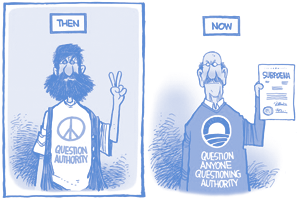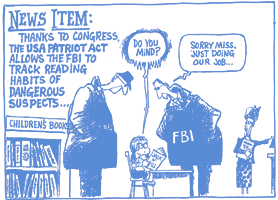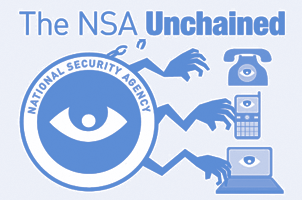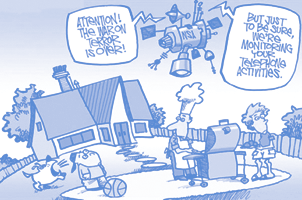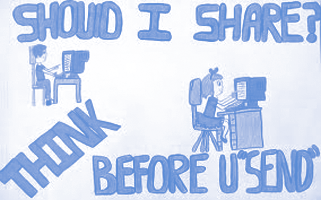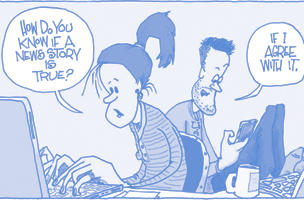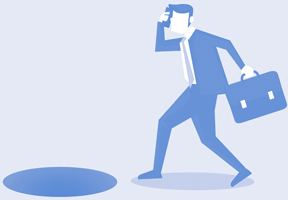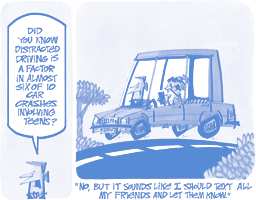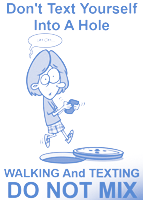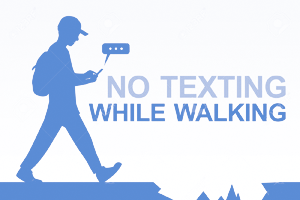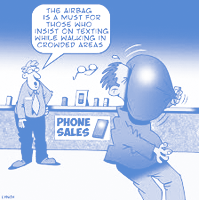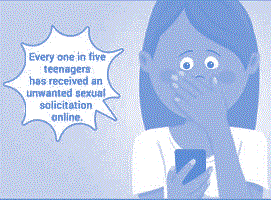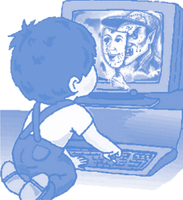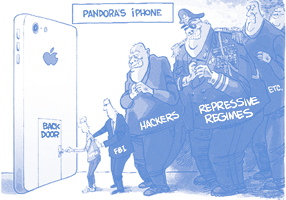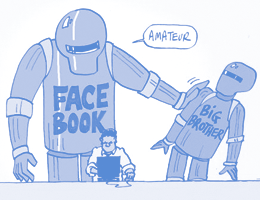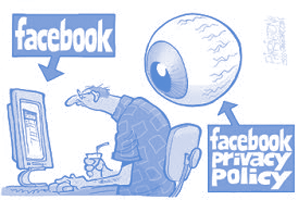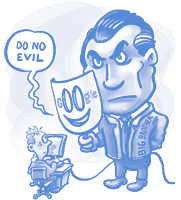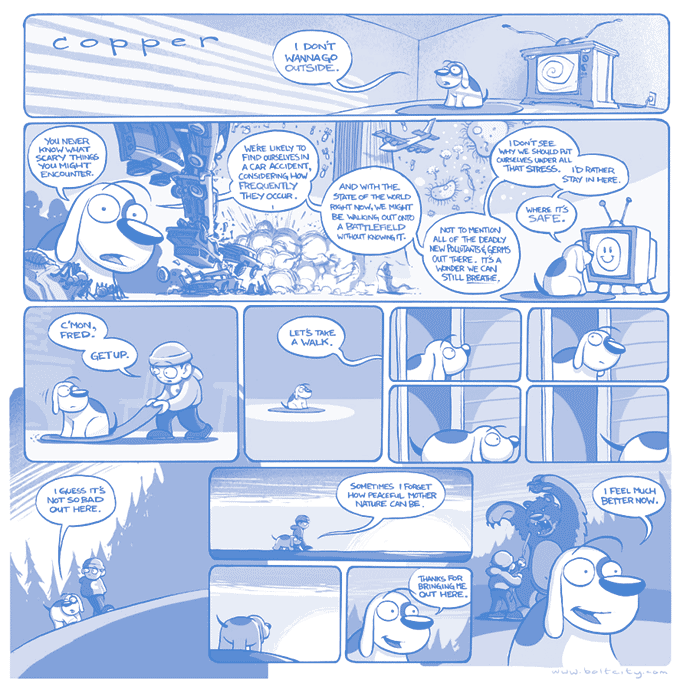

|
After our physiological needs have been satisfied we start to to be concerned about being safe. Safety needs are not like other needs. Physiological needs are clearly substances that we can get, earn or can be given to us. Love and esteem are also given to us or earned. But safety is a state of mind. We can never truly be safe as the universe has so many variables something could always go wrong. At any moment a comet could crash into the earth demolishing it and all life on it, yet this does not make us feel unsafe. When we eat our need for food is satisfied. When a parent loves us our need for love is satisfied. When our peers acknowledge our good works and admire us for them our need for esteem is satisfied. But when is our need for safety and security satisfied? Clearly our need for safety and security is satisfied when we feel safe and secure.  "The man who looks for security, even in the mind, is like a man who would chop off his limbs in order to have artificial ones which will give him no pain or trouble." Henry Miller When are we safe? So when do we feel safe and secure? Obviously people in a concentration camp did not feel safe. Yet is that so? Many kinds of environments seem to us not to be safe yet the people in those environments may in fact, despite the dangers, feel safe. How can this be? The people in those environments simply believe in their abilities to deal with and neutralize those dangers. Some people feel safe in a bad or dangerous neighborhood, if there are many locks on their door, and they are careful who they open for. Other people with many locks on their door in a good neighborhood do not feel safe. 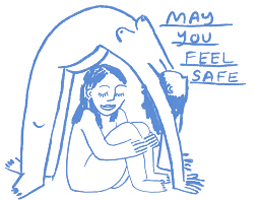
 The
Paradox. Paradoxically we can only learn those
abilities that make us feel safe by putting ourselves in
danger, by in fact making ourselves unsafe. We usually
do this in very small increments. This is most clearly
seen in the case of people with phobias where irrational
fear prevents the person from doing normal everyday
things. The main way in which such people can be cured
is to gradually be exposed to the object of their fear.
If you are afraid of heights go up steps wait till you
feel safe then go up another step and wait again and so
on. Some of the inmates of concentration camps may have made themselves feel safe by using clever words to fog the brains of their captors. Many skills that people learn help them to feel safe. We may learn a fighting skill like kung fu or karate to help us feel safe when walking alone. Making money to buy a house, bush skills, fire fighting, mountain climbing, car driving and running are all skills that can help us feel safe. 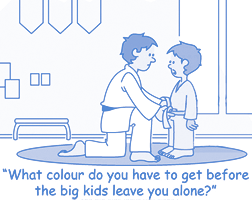
 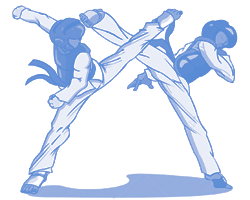 Being and feeling secure. It is not that we necessarily learn these things in order to feel safe, but rather, that we feel safer because we learn them. Every time some other need causes us to go out and confront the world (ie make ourselves feel unsafe) we usually learn some skill for dealing with the world. Much of what makes us feel safe and be safe in recent times involves simply taking common sense precautions. Simple things like locks, seat belts, motor cycle helmets, hard hats, steel toed boots and learning to lift the right way can all help. The strange by-product of learning these skills is that once leaned they have the effect of making us feel safe. In the end it is our confidence in our ability to deal with situations that are potentially unsafe that allow us to feel safe. If other needs cannot overcome the need to feel safe and secure these skills are never learned and so the person never feels safe. Learning (the harbinger of growth, reform and change) is essential to feeling safe. "Only in growth, reform, and change, paradoxically enough, is true security to be found." Anne Morrow Lindbergh Curiosity first and last. In "Toward a Psychology of Being" Maslow makes a half-hearted attempt to make a case for showing that the safety need is stronger than curiosity and must therefore be lower in the hierarchy.
 From not safe to safe. It is the view of this site, that this tendency noticed by Maslow, far from showing the superior strength of the safety need, rather shows us how we use the need to learn/know (or explore) to help satisfy our safety need. Despite the fact that very young children feel unsafe when not close to their mothers, they never the less do venture away from their mothers. The child wants to feel safe, and does feel safe near the mother, yet the child moves away from the mother. Why? To satisfy curiosity certainly, but this activity also helps to satisfy the need to feel safe. He/she wants to feel safe when he/she is away from the mother as well as when he/she is with her. As the child moves further and further from the mother and nothing bad happens the child begins to feel safe away from the mother. He/she actually feels safer than he/she did before. Before he/she only felt safe near the mother but now he/she begins to feel safe away from the mother as well as when he/she is close. The need to explore has actually helped in satisfying the need to feel safe. The child may be trying to satisfy the need to learn or in fact any of the other needs when they do this, but as a side effect, when nothing terrible happens to them, they begin to feel safe further and further from their mothers. 
Small Steps to Safety. It is fear that makes us
feel unsafe and insecure therefore by overcoming our
fears we can satisfy our need for safety and security.
By facing our fears, taking precautions and learning
skills we build our confidence in our abilities so as to
feel safe. We can face some unwarranted fears in small
increments. The person afraid of heights can climb a
ladder one rung at a time never moving upward until he
is sufficiently secure at that height. He gradually
gains confidence in his ability not to fall. Some people
feel that by facing and overcoming an extreme fear like
fear of heights or falling this lack of fear will
generalize to enable them to overcome other fears. So a
person may learn to sky dive and through overcoming that
fear of falling also start to overcome fear of rejection
or fear of making a fool of themselves. Never forget
though that the need to feel safe is there for a reason
and there is such a thing as being overconfident in our
abilities to deal with risk. Some fears can only be
overcome by the learning of new skills or taking
sensible precautions. New skills are usually best
learned in gradual steps also where fear is concerned. The idea of gradual steps to safety is perhaps best explained by the tension between parent and teenager. The teenager is constantly trying to do new things by him/herself. But often the parent does not think the teen is ready. It is a constant dance the parent letting go a little and the teen trying to pull away showing he/she is capable. Another good example is teaching a child to swim. The teacher, at first, places a hand under the child's body to support him or her. But gradually the teacher uses less and less upward force to support the child as he/she gains skill and confidence. Finally the teacher removes his/her hand completely. All these things happen in gradual steps. 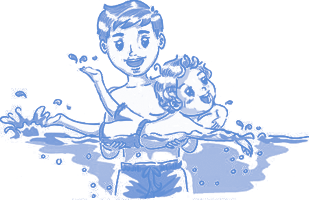
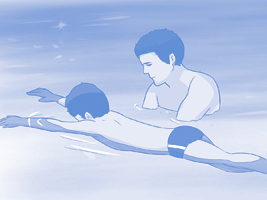 Stepping
stones. Another way to look at this is to
consider each ability we learn is a stepping stone to
feeling safer and more secure. The way we learn those
abilities is through the strength of other needs which
draw us out from being safe and by building those
abilities in small steps. The person learning to sky
dive does not just jump out of a plane. First he has to
learn how to operate the equipment, then he has to learn
to trust that equipment in increasingly riskier
simulations until he has sufficient confidence in
himself, the equipment and the pilot of the plane to
actually jump out of a plane. The greatest skill we can
learn to make ourselves feel safe is to learn how to
influence others because there is safety in numbers and
cooperation. Just remember not to trade away important
values to feel safe. 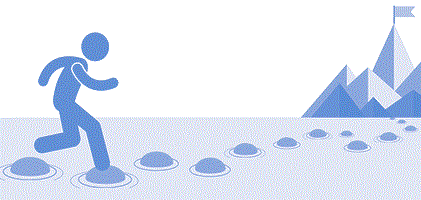

The changing world of safety and security.
The price of safety and the frailty of the human
spirit. Safety and security have always been
used to manipulate and dominate others. There have
always been people who in their desire to dominate
others have offered to provide those others with safety
and security for which they want something in return.
Human frailty can lead us into the temptation of giving
up other important values in trying to become safe or
secure. The main problem is that people can be convinced
to give up both privacy and liberty (and other important
values) in pursuit of safety and security. We tear down
our comforts, our privacy and our freedom just to get a
little safety. Often this takes the form of walls that
keep others out but simultaneously fence us in. 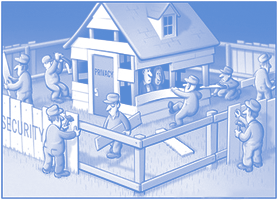

This is,
and has always been, a bad bargain. If we let some other
person (even a parent) satisfy our need for safety it is
no longer truly being satisfied and we will be stuck at
this need level. The only way to truly satisfy this need
is to find ways to satisfy it ourselves. Of course the
price we are paying is also far too high. Benjamin
Franklin had a lot to say about this as portrayed in the
quotes below. 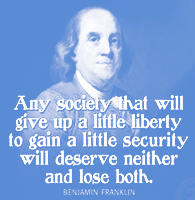
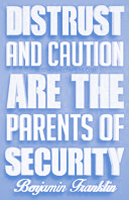
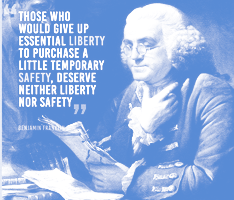 The
right to be safe and secure. In time past the
safety of an individual was always at the whims of those
with power. In the feudal system the king or queen is at
the top and this position was held as a divine right
despite the fact that originally the position was
acquired by force of arms or some other form of power.
The king would have offered safety to those who followed
him and fought for him. To be safe you had to choose the
winning side. But few felt very safe as they were always
fighting to be the top dog. The other great power in
ancient times was of course religion. Like the kings the
religious leaders promised safety and security to have
obedience. 

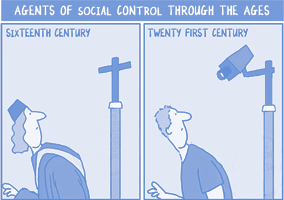 With a
system like democracy, which came much later, the idea
of safety and security was often taken as a right for
all persons especially now in modern times. But those
who seek power over others have ever sort to find ways
around this idea. In this time new technologies are
seriously eroding both liberty and privacy. Like fire
the devices of surveillance are good servants but bad
masters. The technologies used for security are, in this
age, is swallowing everything. 
All Needs. It is true of all needs that when we are young we may need help in satisfying those needs. But as we grow older it becomes more and more important that we are able to to satisfy those needs alone without help. This is particularly true of the need for safety and security. Yet, as this site has shown, in order to learn the abilities needed to make oneself safe one must actually forgo safety. The need for safety prevents moving on to higher needs, if it is not satisfied regularly. But also the need for safety and security can become very non-growth promoting if we somehow come to fear the wrong things. While we
humans, are probably safer now than at any previous
time, we certainly do not feel safe. Some people come to
even fear to love or be loved. To love or be loved you
must put yourself out there where it is unsafe. The
desire to learn and know normally helps people to take
this risk and move beyond safety. In the process they
learn how to feel safe when exposing their emotions. But
if they can not push past their comfort zone they will
never satisfy love and belonging. It is given up so they
can feel safe. Similarly, some people fear being noticed
because they are afraid of being wrong, making a
mistake, or failing. But by hiding they have to forgo
gaining the esteem of others and their own self esteem.
Worse yet people can come to fear their inner self and
thus of course are unable to actualize that potential.
Almost anything can be given up in order to feel safe.
Much is given up because of tech. The new technologies,
however, are not alone in making us feel unsafe. Many
psychological theories and religions help to aggravate
this fear of becoming by stressing that our inner nature
is evil, or as did Freud, make it amoral with a theory
of a primordial Id. However, we are not born evil. We
are either born a blank slate or we are born good and
made evil by our environment. Maslow and the 3rd force
psychologies have shown us considerable evidence that we
are born with innate meta values of justice, truth and
goodness. Despite this born evil beliefs still have
great impact on society unfortunately. 
 The Pathology of Safety and Security. Some people never feel safe. They go through their lives stuck at the level of safety. Sometimes the very environment, in which they were brought up, never felt safe. Parents who punish excessively often create such fear in their children as to never allow them to feel safe. This early lack of safety and inability to make themselves safe can lead to a lifetime of seeking safety. 

Parents can create difficulties with safety by over
protecting their children. Thus parents in their concern
to make their children safe may prevent their children
doing the very things they need to conquer their own
fears or learn the skills needed to feel safe. Parents
that are over concerned with their children's safety
often prevent them trying risky sports, risky physical
activities of any sort, risky intellectual activities
and risky social activities. The result is a
mollycoddled child unable to make themselves safe or
feel safe. They may be willing to give up their entire
freedom to feel safe and secure. 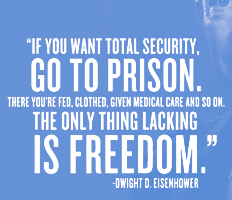 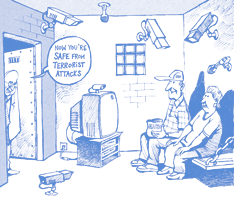 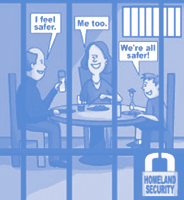 Fear is the great non-motivator for many so called normal people in the normal society. Although the only way to truly make yourself safe is to become competent at making yourself safe, many people instead rely on others to make themselves safe. The news media do not help in this regard indeed they make things worse. They blast us with sensational news much of which is is intended to make us fearful and anxious. 
When others stand up for these people they feel safe. They go on through their lives letting others make decisions and perform actions to make them feel safe just as the child does. Like the child who never feels safe away from their parents this type of person also never feels safe away from the person or persons they are using as a parental substitute. 

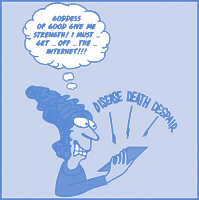 They do
not experience love and belonging as the satisfaction of
that need but rather as the satisfaction of their need
for safety. In this scenario love and belonging become
an addiction complete with withdrawal symptoms if the
love and belonging are removed. Bullies and others that
hunger for power prey on such people. They say: follow
me and I will make the decisions. I will make you safe.
If you are with me kicking the other guy you are not the
other guy being kicked. Although they never really feel
safe the need for safety in such people is very strong.
So strong that little brainwashing is required to cause
a change in their whole moral outlook as is evidenced in
such people as Patty Hurst. However, in a world where
safety has been withdrawn we are all open to this to
some extent. There is a whole area of psychology devoted
to people, who for what ever reason, become captives of
other people. These people, out a desire to make
themselves safe again, start to empathize with their
captors and experience positive feelings toward them.
This is called Stockholm syndrome. 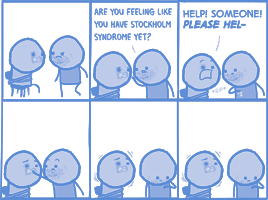
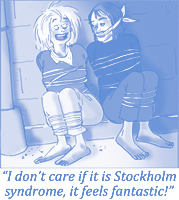 Here is a perfect cartoon on safety. The dog is afraid to go outside. He thinks it is not safe outside. His master convinces him to go outside. The reality is that sometimes it isn't safe outside and sometimes it is, but if it isn't, and you have learned certain skills, you will still be safe.
The unsafe world. We
have always lived in an unsafe world. Stone-age people
were always unsafe because of predators. The middle ages
was a nightmare time of plague and constant waring. This
time is similarly unsafe. It is just that the things we
need to be safe from have mostly changed. Perhaps the
most important change is surveillance. Many today feel
themselves unsafe because it feels as if their every
action is being watched and that constant scrutiny makes them
feel unsafe and insecure. Some of us already live in
Orwell's nightmare world where big brother is watching
us. 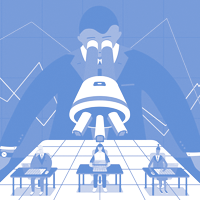
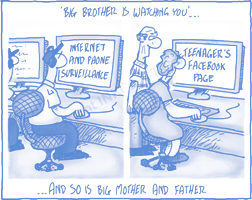 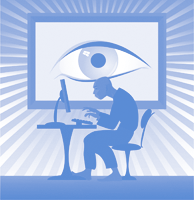 One thing that has not changed is the danger of plague. Because tourists have been able to travel quickly all over the world a virus has suddenly spread to almost every corner of the earth. The world is currently in the grip of a world wide pandemic. We live in a time of danger when going outside is not very safe due to Covid 19. But we have to go outside to eat and do minimal things to live a good life. We have to find ways of making ourselves safe by following protocols and taking precautions.  Climbing the Hierarchy. Maslow not only devised his hierarchy of needs but also devised a theory of how humans moved from one level of need to another. He was of the opinion that satisfaction of needs led to their becoming less dominant immediately causing the next level of needs to become dominant. He also felt that if needs were satisfied on a regular basis they would become weaker as the other needs became stronger. Now while this is obviously correct it seems as if he has missed two important ways these need to be modified. Firstly needs often do not conflict and actually support one another. Secondly, the weakening of the safety need happens not so much because it is regular but rather because we believe we cause it to be regular. The safety needs only weaken when the person or organism is confident of his/her ability to satisfy that need. It is I think very clear with safety that if we rely on others to make us feel safe we will never really feel safe. It is our confidence in our own ability to make ourselves safe that enables the need for safety to be truly satisfied. The
Role of Parents as Regard Safety Needs. Parents,
society, and the institutions of society have a distinct
and similar role to play in the satisfaction of people's
safety needs. The role of good parents is to satisfy
their children's safety needs while they are still
incapable of keeping themselves safe. For the most part
parents always try to keep their children safe, it an
imperative built into their genes. Parents are often
willing to give up their own lives in order to keep
their children safe and secure. Other care givers may be
less so inclined. Regardless,
a good parent or guardian firstly satisfies directly the
safety needs of those in their care while they are
infants and unable to satisfy their own safety needs.
They should do this without contributing to the child
feeling unsafe through excessive punishment. They should
also do it without conditions. For good parents this is
always true. Unlike the physiological needs which can be
supplied in part, safety and security needs are all or
nothing either you are safe and secure or you are not.
Each parent or care giver has the responsibility to do
his or her best to keep those in their care safe. If
they do not they are not good parents/care-givers.
But secondly and more importantly their role is to act as facilitators in enabling those in their care to learn the skills that are needed to satisfy their own safety needs. The most effective way they can do this is by allowing their children to try their wings when the feel ready and not be overly protective as they get older and more competent. A good parent should be able to perceive when the child needs to try to do it by him/herself, when only advice is needed and when the child no longer needs any help at all. While the good parent should want to satisfy his child's safety needs when the child cannot satisfy his own needs, the same good parent should want more for the child to learn how to satisfy his own safety needs by learning certain skills. Paradoxically this often means that parents should encourage those in their care to take controlled risks and confront their fears. Also of course it is the responsibility of parents to help undo any unhealthy fears of growth and facilitate the actualization of all potentials. Also a good parent has to realize that his or her children know far better when where and how safety needs need to be satisfied. These things are also true for any care giver. The Role of Society as Regard Safety Needs. If this is true for the good parent surely it should also be true for society and the institutions of society. However, as already explained above governments and their institutions such as the N.S.A. exact a seep price of liberty freedom and other hard won comforts for the safety they provide. There are many ways in which safety is made conditional in the modern world. As explained above it is bought at the cost of freedom, liberty and our hard fought for comforts. While we cannot expect governments to provide for our safety and security completely unconditionally they could do much more and take away far less than they do. Society and its institutions should supply our safety needs when we are helpless to supply them ourselves, just as our parents do. But more importantly they should strive to enable us to learn the skills we need to satisfy our own safety needs. Likewise they should be aware that we always know best when safety needs are currently dominating our motivation and thus when this need is to be satisfied. Paradoxically this often means that society should encourage its citizens to take controlled risks and confront their fears. Also of course it is the responsibility of each society to undo any unhealthy fears of growth and facilitate the actualization of all its citizen's potentials. |
Needs
Interest Method
Reality Keys
How to Help Creative
Genius Future What
is Wrong Theories Plus
Thin Slicing Expertise
Self Determination Answers
Iteration
 The
Need to Feel Safe and Secure
The
Need to Feel Safe and Secure 
 Technology and security. Technology has given us
many wonderful modern conveniences but those who would
control us are ever on the lookout for new ways to
implement control over us and here following are some
new ways they have discovered to do so. Technologies
promise to keep us safe and make us secure but they
erode our liberty, our privacy and god knows what else.
They do not, for the most part, even make us feel safe,
but rather find new ways to make us feel unsafe. Or
where they do make us feel safe, they ironically, tempt
us to do things that are very unsafe indeed.
Technology and security. Technology has given us
many wonderful modern conveniences but those who would
control us are ever on the lookout for new ways to
implement control over us and here following are some
new ways they have discovered to do so. Technologies
promise to keep us safe and make us secure but they
erode our liberty, our privacy and god knows what else.
They do not, for the most part, even make us feel safe,
but rather find new ways to make us feel unsafe. Or
where they do make us feel safe, they ironically, tempt
us to do things that are very unsafe indeed. 
